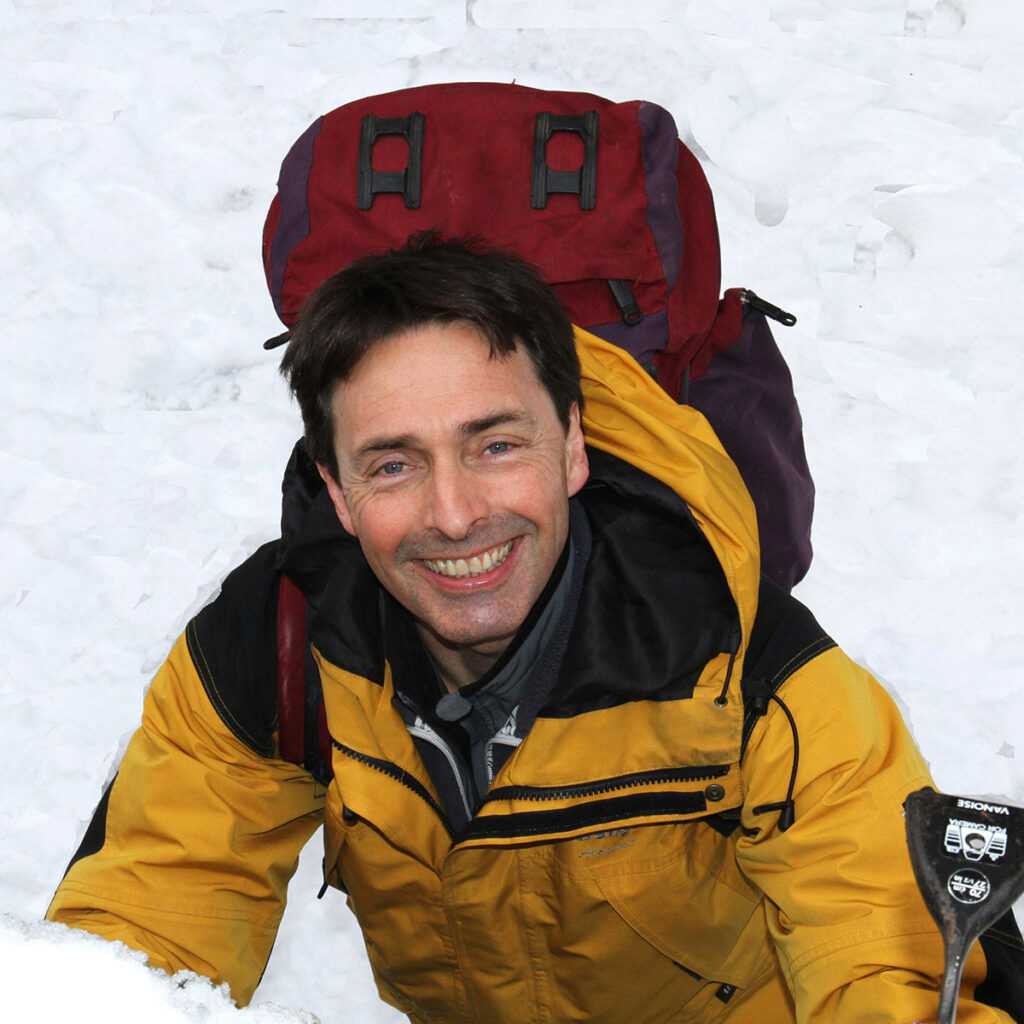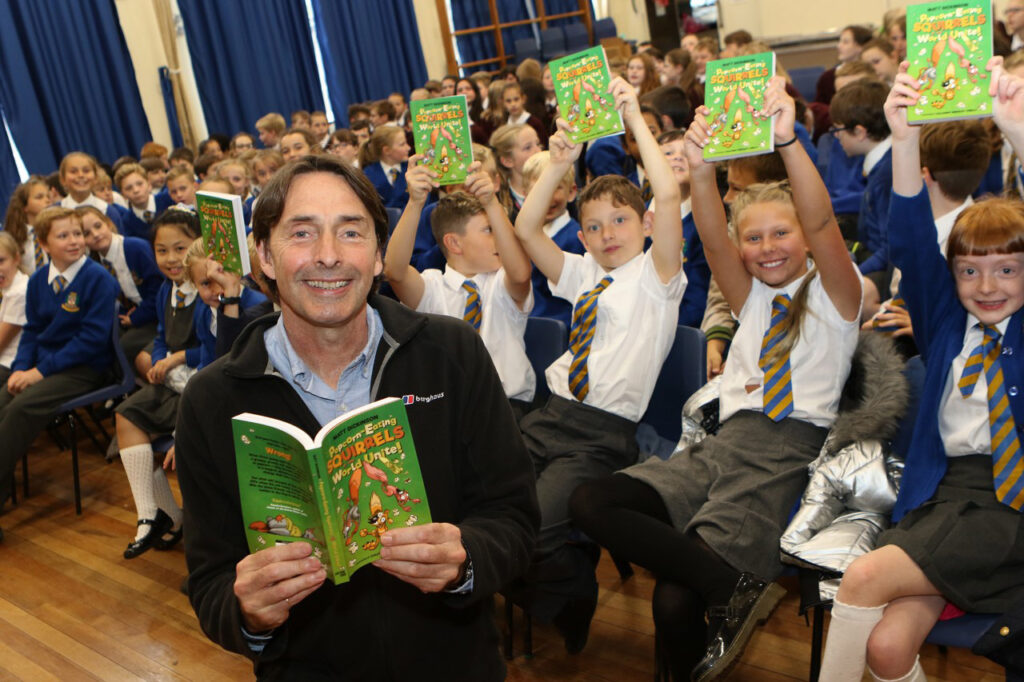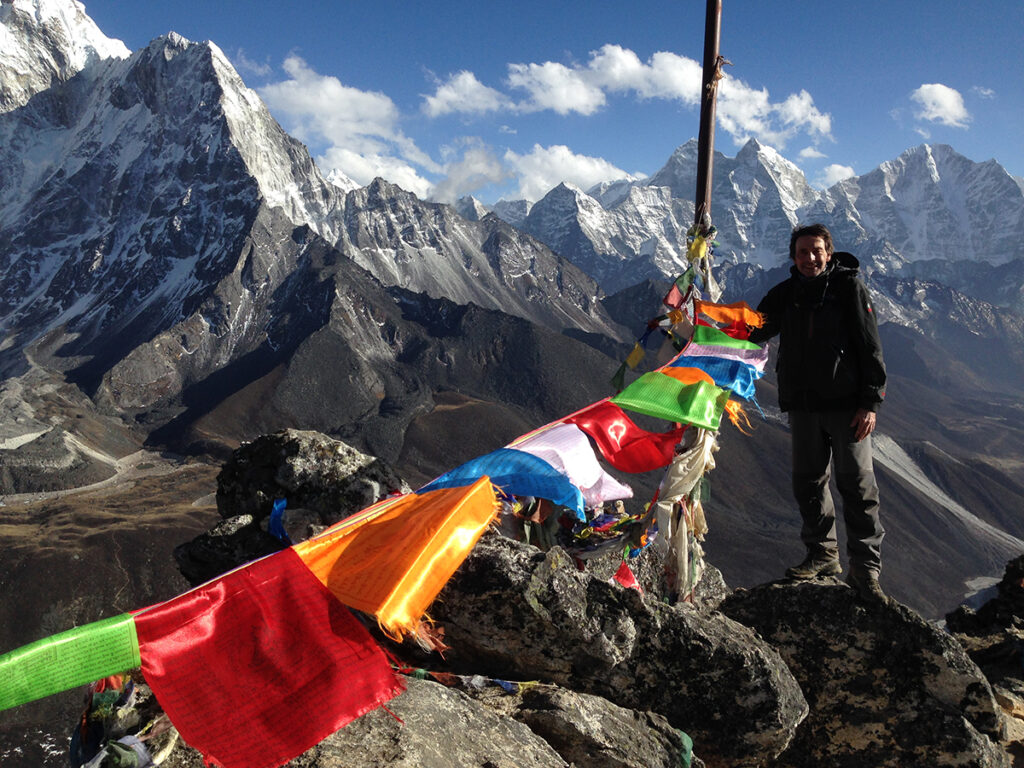
Matt Dickinson

Author, film maker, lecturer Matt Dickinson loves squirrels and libraries. Here he shares tips on using adventure – and in particular climbing Everest, the world’s highest mountain – to help students learn to love reading. Interview by Nicola Baird
At school this author, lecturer and film maker’s adventurous life began with a dream to be a squirrel. You might already know this as it’s a confession Matt Dickinson makes in Popcorn Eating Squirrels: World Unite, one of a series aimed at Year 4-6. “My friends wanted to be dolphins, man-eating lions, tyrannosaurus rexes but me, a squirrel, with shiny eyes, silky fur […zooming…] about trees, flying between branches. Most of all I wanted my feet to swivel around, 180 degrees. I had a hunch it might help on the football pitch and be handy for the push off of 25m crawl. And then there’s the nuts… like Christmas all year round.”

Over a Zoom interview Matt reads his squirrel dream with real aplomb and humour. It’s easy to see how he has become a prolific school and event speaker, brilliant at capturing his young audience’s attention by sharing real life tales of exploring Everest, followed by readings and Q&As about his series for teenagers, the Everest Files. His experiences have also been immortalised in the film Summit Fever and recorded in his account of the expedition, The Death Zone (1997), which has also been used a GCSE exam text by AQA.

Interestingly the father of five, with four grandchildren, doesn’t regard himself an explorer because, “You’ve got to do firsts, so I’m really an exploration film maker. But lots of schools introduce me as an explorer and I understand why.”
Given that he’s known for Everest; did an archaeological survey in the Sahara of an abandoned nomadic encampment for his Anthropology degree dissertation at Durham university; wrote a guide to Long Distance Walks in North Africa (1992); went to the Amazon to direct a Man vs. Wild with Bear Grylls and in Antarctica has climbed peaks and sailed in a small yacht, Matt’s passion for reading and libraries can surprise primary and secondary students.
“I’ve never met an author that wasn’t an active adventurous reader. Inevitably libraries are an active part of your life as a young person.”
Matt Dickinson
But Matt reckons adventurous reading is an essential skill. “I went to Everest base camp this year, with my son Danny, who is 21, and I took my Kindle and read six to seven books on the three week journey going up and down to Base Camp. You’ve got time in the evening, and with a Kindle in your hand you can take your books anywhere – in the old days, books got very heavy. Kindle is a miraculous device for an explorer.”
For Matt libraries offer the same miracles as mountains. “I’ve never met an author that wasn’t an active adventurous reader. And inevitably libraries are an active part of your life as a young person,” he says delighted to have reopened three school libraries in the past few years. “What’s happened is that in the last decade a lot of libraries were given over to technical content and got replaced by screens and computers. Some schools side-lined librarians or, horror of horrors, appointed Y9 librarians, so some heads and senior leadership started to ask, ‘why can’t our pupils write, read or understand what an essay is asking them to do – I wonder if it is because we closed our library?’ They get to realise how important the library is and finally, belatedly, reinstate them when they get funding.
“Libraries have been important through my whole life,” says Matt. “I was a voracious reader right from primary age. I can still remember the excitement of taking out books from the school library at Hemel Hempstead. I was a big user of the town library too, and went every Saturday with my mother and brother to take out books. There was nothing I liked more as a student looking for surprising fiction and non-fiction books to entertain me,” which is why Matt’s currently reading Taking Flight about the various ways flight emerged on planet Earth in four different time zones and a book by Neil M Gunn, The Silver Darlings, (about herring fishing) which he sums up as the, “harrowing story of life and death on the coast of Scotland”.
Everest reading
Although Matt lives in Wells, Somerset he’s been, “working with Harrow SLS for many years, with Rachel. We’ve initiated a number of schemes. In recent years we’ve had the Everest reading challenge for Year 6-8, a special project at primary and secondary schools throughout the borough.”
Matt reckons it’s a good transition project for students, and authors, helping to get students reading.
“I’m very fortunate as a visiting author, or writer-in residence (Matt’s newish venture at international schools, many UK state schools and the Laurus Trust-academies in Stockport and Manchester), to be able to talk about a world which is engaging, particularly to reluctant boy readers by telling real life stories of quite dramatic situations of storms, finding dead bodies, friends who’ve lost their lives in mountain environments and near misses I’ve had myself, and can include photos and video clips,” says Matt. As one of the climbers caught in the 1996 Mount Everest Disaster and as a filmmaker specialising in adventure documentaries, he has a lot to share with audiences of all ages.
“With the Everest Files we go into schools and do a presentation in the summertime about my adventures on the mountain and then talk about the inspiration for the Everest Files book, about a 16-year-old boy who disappears, so it’s like a detective story or thriller. Then having got pupils interested, they take a copy of the book away for summer to do the poster challenge.
It’s worked brilliantly in Harrow, leading to a team up between state schools and an independent, John Lyon, but also in other areas. “On one occasion at a Derbyshire school, we had around 82 per cent success rate, (from a very big cohort) who had read the book through the summer and successfully answered a quiz about it. It gave a message from the school that we require and want you to be a reader.”

What’s your Everest?
Matt has found the writer-in-residence contracts with schools help different departments, including Geography and Science bring “reading for pleasure and creative writing exercises – run by me as an author – into other areas of the curriculum. Librarians love that, and for me as an author it’s great, as with more engagement and impact we can do wonderful things by the end of the year.” Recent successes include creating an anthology of students’ work. “Pupils work on a theme through the year, eg, What’s your Everest?, to create a piece of writing talking about their own dreams and aspirations. They may want to be Hollywood actresses, Formula 1 racing drivers, You Tubers or go to Mars and be Elon Musk and they write a piece about that, and we put that into the anthology,” he explains.
“It’s a way for schools to make a statement about reading for pleasure and their ambitions for writing, literacy and confidence in writing skills which is so perilously lacking with so many students. I think confidence in writing skills is at an all-time low, but schools are beginning to realise that [this happened because of] a toxic combination of covid and less reading for pleasure by children, plus a lot of schools neglected or abandoned their library. Given that Matt can visit more than 100 schools in a year to give inspirational talks and workshops it’s perhaps no surprise that he feels his new project, an adult thriller, feels over due. “I’m two years into it, 45,000 words, but going really slowly,” he says explaining that the “characters have back stories in pretty wild places.” And of course that sounds gripping, just the sort of book many of the school students he’s inspired to read with his wilderness stories for-all-ages will enjoy. They’d probably cheer him on too, knowing just how hard desk-sized mountains can be to summit.

